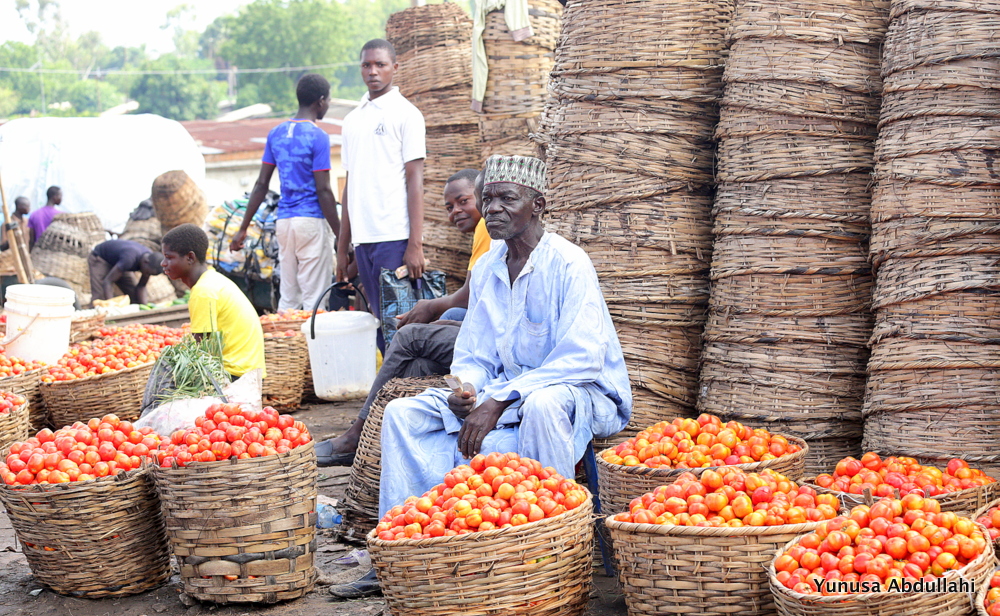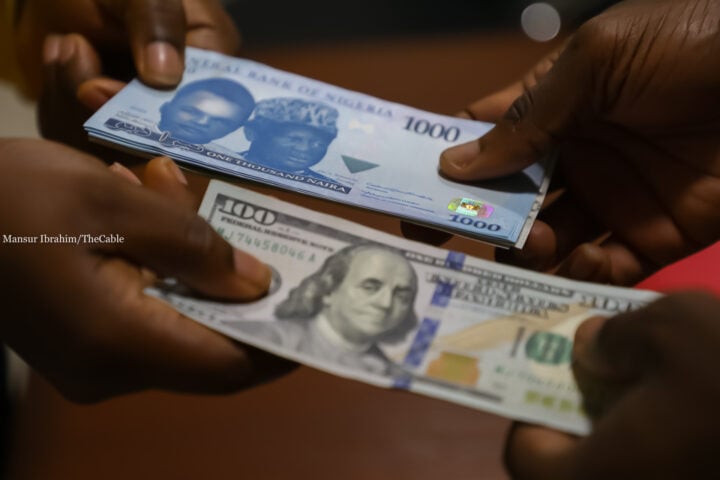A new record was unlocked in Nigeria’s foreign exchange (FX) market on January 29, 2023, as the naira lost 51 percent value against the dollar, trading at N1,348 — the highest rate ever.
The local currency, on January 31, 2023, continued its depreciation against the greenback, surpassing the black market value for the second time in nine months.
The financial market saw the gap between the official and parallel FX rates shrink further — similar to the convergence that occurred on June 20, 2023.
The convergence had occurred one week after the Central Bank of Nigeria (CBN), the country’s regulator, announced the unification of all segments of the foreign exchange market — effectively floating the naira on June 14, 2023.
Advertisement
Since the central bank eased its control of the naira, allowing the local currency to float and be determined by market forces freely, the FX market has recorded fluctuations of varying proportions.
The volatility, which is currently a concern to various stakeholders, is a reaction to the policies implemented by the apex bank at the beginning of the incumbent government’s administration. The naira has now lost over 45.23 percent of its value at the official market year-to-date, by TheCable’s calculations.
On February 2, 2024, the CBN said it would stop daily cash reserve requirement (CRR) debits of deposits in commercial banks as part of efforts to increase FX liquidity. Prior, the apex bank removed the limit on the exchange rate quoted by international money transfer operators and directed to sell off their dollar holdings.
Advertisement
While the regulator has promised to continue to make moves to restore stability in the market, Nigerians are wondering what the new FX rate in the official window means.
TheCable looks at the good, bad, and ugly implications of the high FX rate being recorded daily in Nigeria’s official window.
THE GOOD
BOLSTERS REPATRIATION OF FUNDS BY COMPANIES
Exporting is a crucial aspect of business operations as it expands their reach globally and boosts revenue. It also helps companies increase their competitiveness and broaden their market. For Nigeria, exports are deemed a solution for its chronic FX crisis.
Advertisement
With the high exchange rate in the official window, companies can now repatriate their export proceeds through the official channel and get more value in naira.
This contrasts with what was obtainable when the government controlled the rates on the official FX market where investors and exporters typically trade.
With the willing buyer, willing seller model determining the performance of the naira against the dollar, companies will begin to consider bringing their dollars into the country. This would help increase liquidity — a problem the CBN is trying to curb.
MORE REVENUE TO THREE TIERS OF GOVERNMENT
Advertisement
Also, with the current rate of the naira, revenue accrued to the three tiers of government (federal, state, and local government) is expected to soar since the revenue from the federation account allocation committee (FAAC) is disbursed in naira.
Simply put, the three levels of government will receive an increased naira equivalent for their share of the federation’s dollar income.
Advertisement
Following the ‘subsidy removal’ and the devaluation of the naira, the FAAC allocation increased significantly from N786.161 billion in June 2023 to N1.959 trillion in July.
GOODBYE TO ARBITRAGE
Advertisement
For a long time, the gap between the official and black market exchange rates has been exploited by speculators. A typical scenario is when a person buys dollars at a lower rate at the official market and sells it at a higher rate at the black market.
However, when there is little to no difference in market rates, these speculators are less inclined to use the parallel market.
Advertisement
President Bola Tinubu had, on June 30, 2023, expressed worry about the spate of arbitrage in the system, saying he unified all FX trading windows to save the country from financial hemorrhage.
In addition, convergence or a reduction in the FX rates gap may shrink patronage at the street market, channelling forex to the official window.

THE BAD
DOLLAR VALUE OF GDP TO DROP
Nigeria is currently Africa’s biggest economy with a gross domestic product (GDP) of $477.38 billion in 2023. While this has been a source of pride for most locals, the continued weakening of the naira threatens this.
The devaluation of the country’s currency could lead to a drop in its GDP value in dollar terms — making a mockery of Tinubu’s ambition to achieve a $1 trillion economy.
“Distinguished audience, a one trillion dollar Nigerian economy is possible by 2026, and a three trillion dollar economy is possible within this decade,” he had said.
“We can do it with double-digit, inclusive, sustainable and competitive growth.”
Tinubu had also said financing the country’s $3 trillion national infrastructure stock can be achieved in 10 years and not in 300 years.
AIRFARES, COST OF CARS TO INCREASE
One of the unpalatable implications of the current FX rates is that travellers would spend more money on airfares. Already, tickets for foreign airlines are high.
This would be exacerbated by the consistent depreciation of the naira as international carriers would adjust rates for tickets as the dispute between the federal government and foreign airlines over the repatriation of $700 million continues to determine ticket pricing.
Also, the cost of imported cars is expected to increase as the depreciation pushes up vehicle duties.
On February 2, 2024, the Nigeria Customs Service (NCS) adjusted the FX rate for its tariffs and duties. The NCS further increased the rate to N1,413.62 per dollar the next day.
THE UGLY
NIGERIANS SCHOOLING ABROAD TO SPEND MORE
A more severe downside to the currency devaluation is that Nigerians studying abroad will now spend more on tuition.
Even if students buy forex via banks, they would be getting it at a much higher rate, cutting off the advantage of reduced cost when the exchange was around N400 at the official market.
Sponsors or parents will be helpless since the black market rate is equally high.
COST OF IMPORTED MEDICINES TO RISE
Again, the cost of medicine is expected to skyrocket due to the increase in the cost of imported drugs and the exit of multinational companies from Nigeria.
Nigeria is still largely import-dependent and pharmaceuticals are constantly faced with FX challenges during the importation of raw materials.
On August 3, 2023, GlaxoSmithKline (GSK) Consumer Nigeria Plc announced plans to cease operations and transfer its business activities to a third-party company.
Similarly, on December 6, 2023, P&G announced its intention to halt local production in the country. The exit of the firms was linked to FX crisis in Nigeria.
INFLATION TO RISE FURTHER
In addition, there will likely be a surge in the country’s inflation rate due to the depreciation of the naira. This is because, other than the fact that the country relies on imports on many fronts, it still imports its petroleum products — petrol, diesel, and others — which are critical inflation drivers.
An increase in energy costs will take a toll on businesses that rely on petroleum products for operations. It would drive up the cost of transportation, which could have a ripple effect on logistics and ultimately impact the prices of goods and services.
In December 2023, headline inflation increased to 28.9 percent — representing the 12th consecutive rise since December 2022 when it dropped.
Cardoso had forecast that the country’s inflation should reduce to 21 percent in 2024. But that is only left to be seen.
Add a comment






